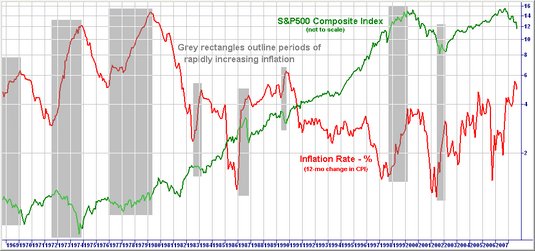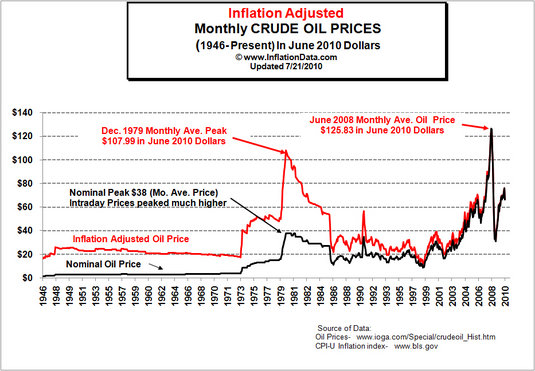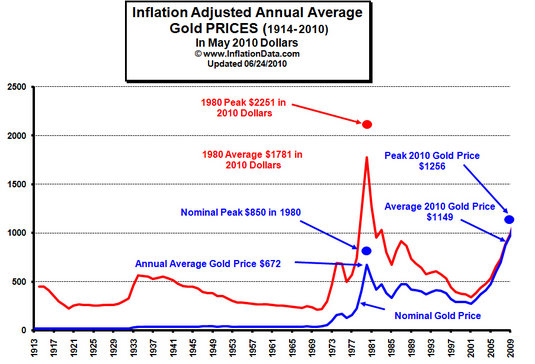
Not that any of them are all that great.
The hot air balloon above is inflating. Get it? Get it?! Sorry. I’m tired.
There are only so many ways our government can eliminate the deficit and eventually pay off its gigantic debt. The least painful—and the one federal officials were desperately hoping for when they enacted the stimulus—is to grow the economy. With the economy growing, they get more tax revenues without having to change any laws.
Two, less optimum solutions are to raise taxes or spend less. Both of those make voters angry. Spending cuts sound good until you realize it means your kid’s classroom goes from 25 students to 30 students. Raising taxes never plays well, even when you purport to target the highest-income households.
That leaves inflation. No politician has to vote for it. It’s hard for rivals to point to interest rates and say, “Congressman Smith did this!” Inflation is simply the easiest way to pay off the deficit without alienating your constituents. Yeah, it’s weak, but when push comes to shove, you’ve got to believe inflation is going to rise before Congress successfully balances the budget.
So where does that leave you? And what can you do to make sure a devaluing dollar doesn’t decimate your portfolio? And for that matter, how can you stop Pop from excessive alliteration?
The myth of stocks as inflation-fighter.
One of the most common arguments in favor of investing in stocks is that they keep your portfolio from being silently eaten away by inflation. For your retirement money to keep its earning power, the yarn goes, you need assets whose returns will outpace inflation. Stocks are one, good answer.
Except they aren’t. In fact, stocks tend to do terrible when inflation is high. Take a look at this chart from Martin Capital Advisors.
In times of rapid inflation (the gray boxes), the S&P 500 (the green line) tended to drop, sometimes by a huge amount.
The point is, while stocks will probably outpace inflation over the long-term, holding stocks as a short-term panacea to what you might think is a coming bout of major inflation doesn’t make sense. Indeed, it seems misleading that the two issues ever got combined. Yes, inflation is an enemy to your portfolio. Yes, stocks—even at a conservative 5% growth rate—outpace the average inflation rate of about 3% over the longterm. But the two aren’t built to counteract each other.
What about commodities?
It would seem that commodities—such as oil, natural gas, and, I don’t know, timber—would be better inflation hedges. After all, if prices go up, the prices on the raw goods we need to make things should go up, too. The problem, of course, is that a ton of things, in addition to inflation expectations, influence commodities prices. Let’s take oil for example. This chart is from Inflation Data:
You’ll notice that the 1979 high for oil (in 2010 dollars) wasn’t topped again until 2008. Of course, inflation didn’t go down over that long time period. Quite the contrary. There were just a few hurricanes and a couple major oil crises that jostled the price of oil around, even as inflation made its inevitable climb upward.
Other commodities face similar circumstances. But even if they didn’t, keep in mind: Commodities reflect inflation expectations. So if you’re thinking about buying some oil ETFs right now in expectation of high inflation, you’re already late to the game. Even if inflation does rise rapidly, if it doesn’t keep up with the lofty inflation expectations the market has set for it, commodity prices could still drop.
And I’m tempted to skip gold, but what the hell…
Not that some reasonable people aren’t making arguments for gold investments. It’s just I feel like it’s unfair to keep beating up on this one. One last chart, also from Inflation Data:
Similar to the oil chart, you’ll see that even though the price of gold, currently at about $1,200 an ounce, has surged this year, it’s still nowhere close to the $2,251 peak it reached in 1980 in today’s dollars.
If anything, gold is a crisis hedge. If the U.S. government collapsed and the world collectively decided to revert to a medieval trading system in which precious metals of limited industrial use became the currency du jour, then gold might be a good investment. When I write about this, a common counterattack is to say that the dollar itself only has value by fiat (i.e., because the U.S. government says it does).
They’re absolutely correct, but that’s the whole point. The dollar has the fiat, both from the government and (implicitly) from investors who flock to it in the face of danger. Gold has an implicit fiat from a limited number of investors and practically no governments. And…oh forget it. If you’re going to buy gold, at least don’t listen to Glenn Beck and buy coins through Goldline.
TIPS: An imperfect option, but the closest to perfect you’ll get.
Treasury Inflation-Protected Securities are Treasury bonds created by the U.S. government whose principal also adjusts with the Consumer Price Index. As many people point out, CPI is an imperfect measure of inflation. Even putting aside the specious, government-lies-about-everything arguments for a moment, there is no possible way that what you spend money on will track CPI exactly. If you, for example, have to spend a lot of money on healthcare, whose cost is rising several times faster than CPI, your personal inflation rate will be higher.
However, TIPS, and their less-mentioned cousins, I Savings Bonds, will at least track inflation loosely, without the wild, speculative swings that stocks, commodities, and gold fall subject to.
Right now, a 10-year TIPS bond yields 1.09% after that periodic inflation adjustment. Given that regular Treasury bonds of that length yield less than 3% right now, that implies investors think inflation over the next decade will actually be extremely low.
And best of all, TIPS can easily be bought straight from the U.S. government. One word of warning though, if you buy them this way, make sure you hold them until they mature. Selling individual bonds is expensive, and bond prices will move around as interest rates move. If you think you’ll sell before the maturity date, try a TIPS mutual fund or ETF instead, though they won’t track inflation as exactly.
Anyway, I’m sure there are good arguments in favor of some of the traditional inflation “hedges” investors have used over the years, and throwing a few charts out there does not a Ph.D. dissertation make. How would you challenge some of the arguments I’ve laid out here?



{ 1118 comments… read them below or add one }
← Previous Comments
Absolutely bursting with personality — amazing job!
This had so much spark and energy — WOW!
This article practically radiates enthusiasm — fantastic!
I feel more informed after reading this.
I admire the clarity and confidence in your writing.
Such a dynamic and exciting piece — I’m impressed!
You absolutely nailed the tone — energetic and sharp!
I appreciate how honest and thoughtful this post is.
You continually raise the standard for great content.
This is the kind of content that wakes people up — amazing work!
This post is a breath of fresh, enthusiastic air!
This should be the standard for exciting writing — brilliant!
You’re raising the bar with posts like this.
This is a 10/10 — easily the best post today!
I love how engaging and informative this was.
This post was absolutely fantastic from start to finish.
You’ve made this topic far more approachable.
I’m seriously impressed — this post is next-level!
← Previous Comments